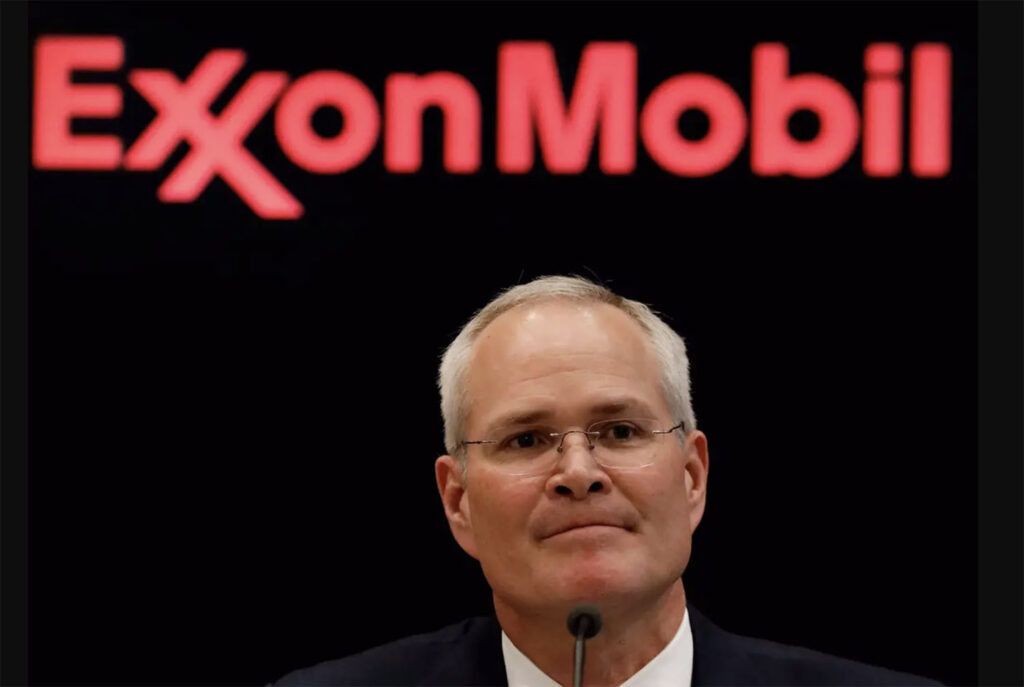By Alliance President Terry Gips
It’s hard to believe, but ExxonMobil CEO Darren Woods basically said the public is responsible for the climate crisis while denying Exxon responsibility during a February 27 interview with Fortune, according to The Guardian’s explosive, hard-hitting review of the transcript. It’s outrageous, especially for one of the world’s top contributors to emissions that has continually lied about the impacts of fossil fuels and spent massive amounts of money to oppose legislation addressing the climate crisis while reaping obscene record profits from planetary destruction.
Sadly, this is just a continuation of Exxon’s long-standing denial of corporate responsibility, which goes way back to the massive and tragic 1989 Exxon Valdez oil spill. “It’s like a drug lord blaming everyone but himself for drug problems,” said Columbia Business School climate economist Gernot Wagner. “What they’re really trying to do is to whitewash their own history, to make it invisible,” said Robert Brulle, an environment policy expert at Brown University. Equally painful, Woods sees the need for alternatives but isn’t willing to do them.
See How Devious Exxon is Blaming You as a Consumer
According to the Exxon CEO, “The dirty secret nobody talks about is how much all this is going to cost and who’s willing to pay for it. The people who are generating those emissions need to be aware of and pay the price for generating those emissions. That is ultimately how you solve the problem.” While the concept of paying the full real costs of everything is valid, then Exxon should pay the real costs to health and environment upfront through a heavy carbon tax (which they oppose) and then policymakers can figure out how to address related equity issues.
Harvard historian of science Naomi Oreskes has clearly exposed their strategy: “The playbook is this: sell consumers a product that you know is dangerous, while publicly denying or downplaying those dangers. Then, when the dangers are no longer deniable, deny responsibility and blame the consumer.”
Ironically, the CEO played right along with the playbook, pointing out that the world is “not on the path” to cut its planet-heating emissions to net zero by 2050 and then blamed its consumers: “When are people going to be willing to pay for carbon reduction?”
He then added fuel to the fire, “We have opportunities to make fuels with lower carbon in it, but people aren’t willing to spend the money to do that.” He omitted a rather significant detail that the public and even Congress has been willing to pay to lower carbon, just not by using more fossil fuels. The public wants renewable alternatives, as evidenced by the passage of the Inflation Reduction Act.
The Guardian points out that, “Woods does not mention that his company lobbied to fend off provisions in an earlier version of the legislation that would have levied heavy taxes on polluting companies to pay for climate efforts, or that a top Exxon lobbyist was filmed saying that the firm’s support for a carbon tax was a public relations strategy meant to stall more serious climate policies.”
Oreskes further uncovers the Exxon playbook: “For decades, they told us that the science was too uncertain to justify action, that it was premature to act, and that we could and should wait and see how things developed. Now the CEO says: oh dear, we’ve waited too long. If this isn’t gaslighting, I don’t know what is.”
Brown’s Brulle emphasizes that the vast majority of Exxon’s own investments are still being put toward fossil fuel expansion: “This is what they do: they’re going to basically blame the victim, the American public. They spend on fossil fuels and they spend billions trying to influence public opinion, but we’re supposed to foot the bill for the damage.”
The Guardian goes on to point out something that the Alliance has addressed, “The video interview comes as Exxon is pursuing a lawsuit against activist shareholders who are aiming to push Exxon to take up stricter environmental standards. Those shareholders, Woods said, were trying to stop Exxon’s central business model of selling oil and gas, which it won’t accede to.”
Exxon’s Real Bottom Line: Record Profits Over People and Planet
As Woods cavalierly says, “We want to cater to the shareholders who are real investors, who have an interest in seeing this company succeed in generating return on their investments. We don’t feel a responsibility to activists that hijack that process … and frankly, abuse it to advance an ideology.” This is just another outrageous statement as leading investment firms are beginning to pull out investments from fossil fuels because of the financial risk they hold.
But the real bottom line was surprisingly bluntly stated by the CEO: Exxon does not “see the ability to generate above-average returns for investors” from established clean energy generation such as wind and solar. We recognize a need for that. We just don’t see that as an appropriate use of ExxonMobil’s capabilities.” This is blatant corporate irresponsibility and must be addressed.
What You Can Do About It
Well, there are two simple ways to send Exxon a message: First, don’t purchase from Exxon and Mobil gas stations. Second, make sure you don’t invest in them. Please share this with others and encourage them to join you.

